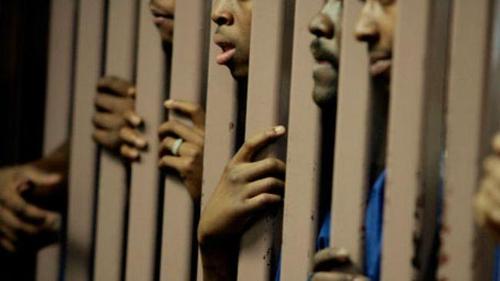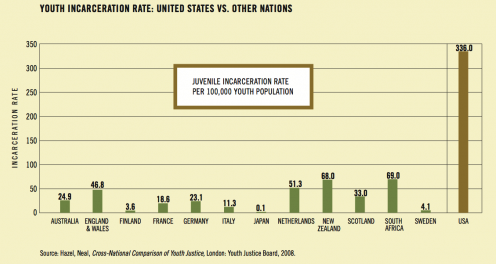 Photo of men looking out through prison bars
Photo of men looking out through prison bars
Dream Defenders Just Picked a Fight with the Youth Private Prison Industry. Here’s Why.
By Josh McConnell
Experts say the continued growth of for-profit prison operators like Youth Services International amounts to a cautionary tale about the perils of privatization: In a drive to cut costs, Florida has effectively abdicated its responsibility for some of its most troubled children, leaving them in the hands of companies focused solely on the bottom line.
—Chris Kirkham, Prisoners of Profit
The proliferation of America’s for-profit prison industry and robust prison industrial complex intricately knits the increasing presence of corporations into our political structure and an existing racialized and problematic criminal justice system. The private prison industry and its juvenile and immigrant detention facilities thus seeks to create what Angela Davis describes as a historical “profitable punishment industry,” analogous to the new supply of “free” Black laborers in the aftermath of the Civil War.
In effect, this industry thrives off of creating a demand for prisoners—predominately Black and Brown bodies—and courts state officials into granting them contracts to develop new facilities. In a filing with the Securities and Exchange Commission, the nation’s largest “corrections” company, Corrections Corporation of America, corroborates this point entirely in a 2005 annual report:
Our growth is generally dependent upon our ability to obtain new contracts to develop and manage new correctional and detention facilities. This possible growth depends on a number of factors we cannot control, including crime rates and sentencing patterns in various jurisdictions and acceptance of privatization. The demand for our facilities and services could be adversely affected by the relaxation of enforcement efforts, leniency in conviction and sentencing practices or through the decriminalization of certain activities that are currently proscribed by our criminal laws. For instance, any changes with respect to drugs and controlled substances or illegal immigration could affect the number of persons arrested, convicted, and sentenced, thereby potentially reducing demand for correctional facilities to house them.
Here in Florida, we have witnessed over several decades the pervasive expansion of privatized adult and juvenile prisons, producing some of the most draconian legislation and egregious recidivism rates in the nation to ensure their survival. Moreover, extensive research and investigative reports have highlighted the vile and deplorable conditions exercised within many of these facilities. Youth have been subjected to physical and sexual abuse, excessive use of force by staff, prolonged isolation, feces infested cells — and even death.

Youth Services International (YSI), formerly known as Correctional Services Corp., has been among the main culprits of substantial political donations and cases of negligence and gross treatment of juveniles in Florida. Chris Kirkham’s groundbreaking two-part investigative report, Prisoners of Profit, examines how YSI, through robust lobbying power, has managed to maintain $100 million in state contracts granted by the Department of Juvenile Justice amid rampant human rights violations.
Although YSI managed 9 percent of Florida’s juvenile jail beds over the last 5 years, it has accounted for 15 percent of all reported cases of unwarranted force and injuries to youth. Among Chris’ salient findings, he concludes that:
- Staff underreport serious incidents such as major fights and staff assaults in an effort to keep the state in the dark and avoid additional scrutiny – a violation of the company’s contracts as well as Department of Juvenile Justice rules requiring that contracted staff report such incidents to state authorities.
- Though state guidelines prohibit “unnecessarily harsh or indecent treatment,” YSI guards have frequently resorted to violence in confrontations with youth, slapping and choking inmates and sometimes fracturing bones, according to police reports. Former employees told HuffPost that YSI often fails to document such incidents.
- Staff turnover at YSI’s prisons is rampant, leaving inexperienced guards to manage a tough population.
- At YSI facilities, food is often in short supply and frequently undercooked. Youth interviewed by HuffPost recounted being served bloody, raw chicken and sometimes finding flies inside pre-cooked dishes. In order to get enough food, youth are allowed to gamble through card games and sports bets while trading “picks” — the right to take someone else’s food at the next meal.
Despite the grave aforementioned mistreatment of youth in YSI facilities, the Florida Department of Juvenile Justice is slated to grant YSI an additional contract for a facility near Miami. Dream Defenders, a student led civil and human rights organization, formed in the aftermath of the death of Trayvon Martin, have launched a campaign designed to pressure lawmakers to call a legislative hearing; halting any further contracts the state may grant YSI.
Last week leaders of the UCF/Orlando chapter of Dream Defenders pressured prominent Democrat in the Florida Senate, Darren Soto, to send letters to the Department of Juvenile Justice and his colleagues, requesting that the state produce all contracts, current pending bids for contracts and documentation of cases of abuse in YSI facilities.
It is critical that Florida maintain a safe, high quality juvenile justice system that focuses on rehabilitation, mental health treatment and positive outcomes for our children. In light of the past history related to the well—documented abuses at Arthur G. Dozier School for Boys and other facilities, it becomes incumbent upon us to continually review reports and patterns of abuse to root out bad actors and assure our children are getting the best chance for success.
A 2010 Southern Poverty Law Center lawsuit cited youth who described Thomas Academy, another YSI facility, as a “frightening and violent place.” The conditions of our children in YSI speak to the way in which the private prison industry operates holistically.
It is imperative that our legislators construct a safe nourishing environment for Florida’s most vulnerable youth. In order for such a landscape to manifest we must formulate alternative institutions and strategies in which punishment itself no longer serves to ensure that justice is served. Such a method would emphasize decarceration and decriminalization at all levels. This means the demilitarization of our schools and dismantling all facets of the school-to-prison pipeline. Moreover, such an approach, as Angela Davis delineates, would foster “revitalization” of our educational system, a “health system that provides free physical and mental care to all, and a justice system based on reparation and reconciliation rather than retribution and vengeance.”
The youth movement is the catalyst to such a paradigm shift where we grapple with and confront white supremacy, patriarchy, homophobia and other structures of domination in order to construct a framework for tomorrow that is conducive to, inter alia, decarceration and the dismantling of the prison industrial complex. Organizations such as the Dream Defenders are actively organizing to ensure that our legislators are held accountable for their actions and decisions and that the voices of Florida’s most marginalized and impacted communities are heard.
For more on Dream Defenders’ fight against YSI, check out their campaign website.

